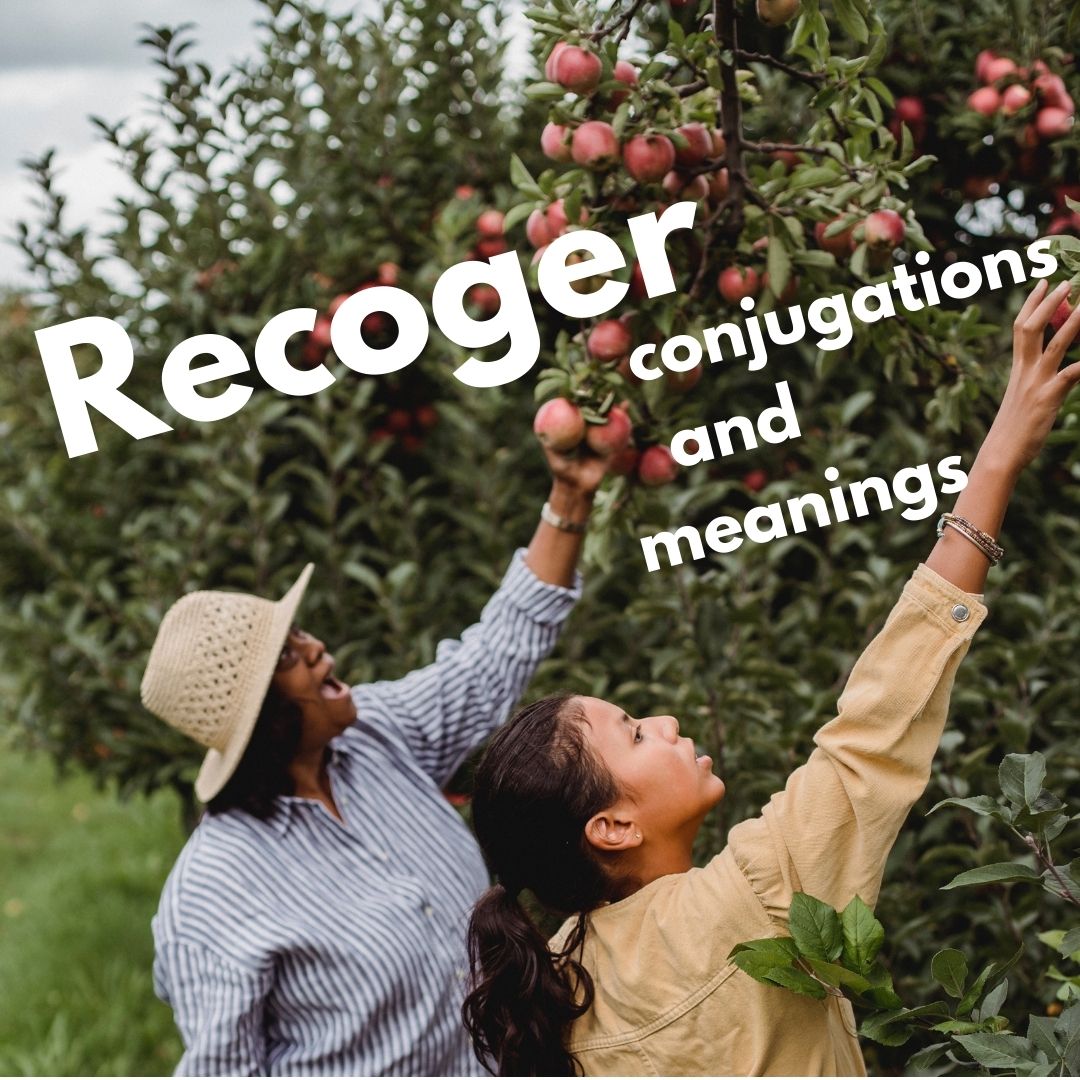Recoger: Conjugation and Meanings of this versatile verb

Get our free email course, Shortcut to Conversational.
Have conversations faster, understand people when they speak fast, and other tested tips to learn faster.
More infoRecoger is one of those common Spanish verbs that we see in all sorts of everyday contexts. Usually translated simply as to pick up, there are actually many other meanings and possible translations of recoger in English.
In today’s post we’ll cover everything there is to know about recoger in Spanish. Starting with the recoger conjugation tables, we’ll be explaining the variations in the stem from -g to -j in some tenses. Then, we’ll introduce 9 different meanings of recoger so you can use this versatile Spanish verb in multiple contexts, including several uses of the pronominal form recogerse.
Let’s get to it!
Recoger: Conjugation
Is recoger an irregular verb? Why does the -g turn into a -j in some tenses? Because the pronunciation of the Spanish g here is essentially identical to a Spanish j, even many native speakers often wonder if it’s spelled recojer o recoger. What’s going on? Don’t worry, it’s simpler than it looks.
First of all, it’s considered an irregular verb since the recoger conjugation varies in some tenses: the g to j change occurs in all of the present subjunctive conjugations, in most of the imperative conjugations, and in the present tense first-person singular conjugation. We’ll see each of these in the recoger conjugation tables below.
These stem changes occur for phonetic reasons, so they’re easy to predict. The g in recoger is pronounced like an English /h/, so to preserve that sound, the g is changed to a j, which is always pronounced as /h/ before a and o. The logic behind this is that in Spanish we pronounce a hard g before a, o, or u, whereas before e or i it’s pronounced with the /h/ sound. With the vowel changes in the affected conjugations, we therefore need the j in order to keep the sound.
Recoger conjugation: Simple tenses
| Subject | Present | Imperfect | Preterite | Future |
| Yo | recojo | recogía | recogí | recogeré |
| Tú | recoges | recogías | recogiste | recogerás |
| Usted | recoge | recogía | recogió | recogerá |
| Él, Ella | recoge | recogía | recogió | recogerá |
| Nosotros, Nosotras | recogemos | recogíamos | recogimos | recogeremos |
| Vosotros, Vosotras | recogéis | recogíais | recogisteis | recogerán |
| Ustedes | recogen | recogían | recogieron | recogerán |
| Ellos, Ellas | recogen | recogían | recogieron | recogerán |
| Subject | Conditional | Present Subjunctive | Imperfect Subjunctive | Imperative |
| Yo | recogería | recoja | recogiera / recogiese | |
| Tú | recogerías | recojas | recogieras / recogieses | recoge |
| Usted | recogería | recoja | recogiera / recogiese | recoja |
| Él, Ella | recogería | recoja | recogiera / recogiese | |
| Nosotros, Nosotras | recogeríamos | recojamos | recogiéramos / recogiésemos | recojamos |
| Vosotros, Vosotras | recogeríais | recojáis | recogierais / recogieseis | recoged |
| Ustedes | recogerían | recojan | recogieran / recogiesen | recojan |
| Ellos, Ellas | recogerían | recojan | recogieran / recogiesen |
Recoger conjugation: Compound tenses
The participle of recoger is recogido.
The gerund for the continuous tenses is recogiendo.
| Subject | Present Perfect | Pluperfect | Future Perfect |
| Yo | he recogido | había recogido | habré recogido |
| Tú | has recogido | habías recogido | habrás recogido |
| Usted | ha recogido | había recogido | habrá recogido |
| Él, Ella | ha recogido | había recogido | habrá recogido |
| Nosotros, Nosotras | hemos recogido | habíamos recogido | habremos recogido |
| Vosotros, Vosotras | habéis recogido | habíais recogido | habréis recogido |
| Ustedes | han recogido | habían recogido | habrán recogido |
| Ellos, Ellas | han recogido | habían recogido | habrán recogido |
| Subject | Conditional Perfect | Present Perfect Subjunctive | Pluperfect Subjunctive |
| Yo | habría recogido | haya recogido | hubiera / hubiese recogido |
| Tú | habrías recogido | hayas recogido | hubieras / hubieses recogido |
| Usted | habría recogido | haya recogido | hubiera / hubiese recogido |
| Él, Ella | habría recogido | haya recogido | hubiera / hubiese recogido |
| Nosotros, Nosotras | habríamos recogido | hayamos recogido | hubiéramos / hubiésemos recogido |
| Vosotros, Vosotras | habríais recogido | hayáis recogido | hubierais / hubieseis recogido |
| Ustedes | habrían recogido | hayan recogido | hubieran recogido |
| Ellos, Ellas | habrían recogido | hayan recogido | hubieran recogido |
Recoger: Meanings
Now that we covered the conjugation business, we can move onto the meanings of recoger in Spanish. In this section we’ll show you 11 uses of recoger, each with their English equivalents.
To pick up
The most common recoger meaning is the equivalent of to pick up in Spanish. This use applies to the idea of lifting things off a surface, such as the floor. It can also be used when picking up a person or object from a location.
It’s worth noting that this use of recoger has no relation with the concept of “pick-up lines” in English. But don’t worry, we’re always a step ahead! If you’re interested in flirting and romance, check out our post on Spanish pick-up lines.
- Ella siempre recoge sus juguetes y los pone en la cesta antes cenar. – She always picks up her toys and puts them in the basket before dinner.
- Recogí el control remoto antes de que papá se diera cuenta de que se me había caído. – I picked up the remote before Dad realised I had dropped it.
- ¿Puedes recoger a Sandra en el aeropuerto a las 3 p.m? – Can you pick Sandra up at the airport at 3?
- Recojan el paquete en la oficina de correos antes del martes. – Pick up the package at the post office before Tuesday.
To gather, To collect
Recoger is also used in contexts of collecting or gathering things. These can be tangible, such as money or books, or intangible, such as information or data.
- Estamos recogiendo ropa para donar al orfanato. – We are collecting clothes to donate to the orphanage.
- Los policías recogen información sobre los sospechosos para resolver el caso. – Police officers gather information about the suspects to solve the case.
To pick, To reap, To harvest
This use of recoger is quite similar to the previous one, only that in this context it applies directly to crops. A synonym is the verb cosechar, which translates directly as to harvest.
It can also be used figuratively, referring to receiving or suffering the consequences or results, good or bad, of an action, as in the expression: “recoges lo que siembras,” meaning “you reap what you sow.” In this context, another suitable translation for recoger in English is to receive.
- Durante las vacaciones, siempre recogíamos fresas para hacer mermelada. – During the holidays, we would always pick strawberries to make jam.
- Los trabajadores no quieren recoger la cosecha de maíz porque hace demasiado calor. – Workers do not want to harvest the maize crop because it is too hot.
- Su pésima administración recogió muchas críticas negativas a lo largo de los años. – Its poor administration received a lot of negative criticism over the years.
To organize, To tidy up
When we’re talking about organizing a space by putting things back to where they belong, we can use the verb recoger in Spanish.
- Si no recoges este desorden primero, no irás al partido de béisbol. – If you don’t pick up this mess first, you won’t go to the baseball game.
- Debo recoger los implementos de arte después de usarlos para mantener el salón ordenado. – I have to clear up the art supplies after I use them to keep the classroom tidy.
- Recojan la mesa, niños, por favor. – Clear the table, children, please.
To bring together, To contain
In this context, recoger is used to refer to subsets of items that represent much larger ensembles. This usage has the nuance of unification, while the verb itself refers to the presentation of the unified items. In translation, other potential English verbs could be to show, to assemble, or to include.
- Esta antología recoge las mejores obras de los poetas rusos del siglo XX. – This anthology contains the best works of Russian poets of the 20th century.
- Estas cartas recogen los sentimientos de Simón Bolívar hacia el final de su vida – These letters reflect Simón Bolívar’s feelings towards the end of his life.
- Las fotografías de su escritorio recogen los momentos más felices de su vida. – The photographs on his desk show the happiest moments of his life.
To take [somebody] in
We can use recoger in the sense of taking someone in to care for them or to be responsible for them.
- Trabajo en un refugio de animales y todos los días recogemos mascotas abandonadas. Es muy triste. – I work in an animal shelter and every day we take in abandoned pets. It is very sad.
- Recogió a su hermano y lo salvó de la mendicidad. – He took in his brother and saved him from begging.
To roll up, To lift up
When talking about clothing, we use recogerse to talk about pulling up long garments to avoid getting them soiled or to facilitate movements. Various English translations might be suitable depending on the type of garment and the method, including to roll up, to lift up, or to gather up.
Since this usage of recoger involves an action carried out on oneself, we use the reflexive form of the verb: recogerse. In these conjugations, we also need to conjugate the reflexive pronoun “se” according to the subject.
- María se recogió la falda para cruzar el río, pero igual se mojó un poco. – María gathered up her skirt to cross the river, but it still got a little wet.
- Recójete las mangas, te quedan muy largas. – Roll up your sleeves, they’re too long.
To tie up, To put up [one’s hair]
Recogerse is used to express the idea of putting one’s hair together and lifting it up. This can be in the form of a ponytail or some other type of hairstyle. From this usage comes the noun el recogido, which can be translated as hair-do in English.
The Spanish word for hair is cabello, although pelo is also very common, so these words are frequently used together with recogerse. Similarly to the previous usage, since this is an action carried out on oneself, this use of recoger also takes the pronominal form of the verb.
- Es obligatorio recogerse el cabello para asistir a la escuela. – Hair must be tied back to attend school.
- Creo que la novia se recogió el cabello para la boda.- I think the bride had her hair done up for the wedding.
- Nos recogeremos el cabello para poder jugar fútbol con comodidad.- We will put up our hair so that we can play soccer comfortably.
To withdraw, To go home, To rest
Our final usage of the pronominal form recogerse is used to refer to the general action of withdrawing. The depth of the withdrawal can take different nuances depending on the context, so English equivalents cold be to go home, to take one’s leave, to rest, or even to isolate from the world.
- Para huir de la ley, el asesino se recogió para siempre en una cueva en las montañas. – To escape from the law, the murderer secluded himself forever in a cave in the mountains.
- Este pueblo es muy tranquilo; la gente se recoge temprano y las fiestas son poco comunes. – This village is very quiet; people go home early and parties are rare.
- Todas las mañanas, las novicias se recogen a orar en la capilla del hospital. – Every morning, the novices retreat to pray in the hospital chapel.
- Nos recogimos tarde anoche porque la conversación estaba muy interesante. – We retired late last night because the conversation was so interesting.
Conclusion: Recoger in Spanish
In today’s post on recoger in Spanish, we’ve covered everything you need to know about this versatile verb.
We started with recoger conjugation rules, including conjugation tables for the simple and compound tenses. We saw that recoger is an irregular verb whose variations occur for phonetic reasons, with the g changing to j in a few tenses when it goes before a and o.
Then we learned how recoger is a verb with many meanings and nuances, well beyond its simple translation as to pick up. In fact, we saw nine distinct meanings for recoger, with explanations and examples for each one. We covered its varied applications such as lifting objects, tidying up, and harvesting, whereas in its reflexive form, recogerse can mean putting up one’s hair or even withdrawing, among other uses.
Now that you know all these possible uses, put them into practice to expand your vocabulary and amaze everyone with your phenomenal Spanish skills. Remember to bookmark this post to review the conjugation and uses of recoger in Spanish whenever you need to. See you next time!



